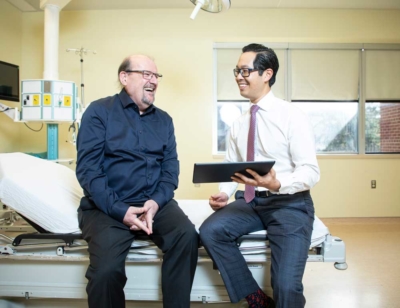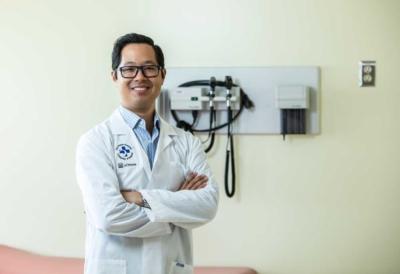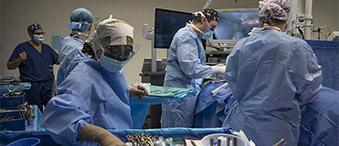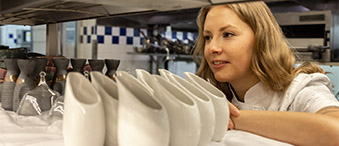Hope despite aggressive skin cancer diagnosis
Diagnosed with a stage 4 melanoma at the age of 62, Dan Collins feared for his life when he learned about the aggressive form of cancer. However, immunotherapy treatment gave him a reason to hold out hope. Dan had hope because of scientists who never gave up; who were determined to turn the tables on cancer and to create a better chance of survival, for patients like him. Hope that a cure is coming.
Discovery of a mass
Four years ago, Dan had been travelling for work, when he started noticing some pain when he’d lean his head back to rest on the plane. He recalls turning to his family doctor to get answers. An ultrasound revealed there was something inside the back of his head that looked like a cyst.
After an initial biopsy, Dan was referred to a surgeon at The Ottawa Hospital Cancer Centre. Another biopsy revealed the cyst was actually a mass. It was melanoma. “I was scared. Cancer had stripped my family of so much. I lost both of my two older brothers and my father to cancer. I feared for my life,” recalls Dan.
Unfortunately, the mass starting growing – and it was growing fast. By the end of July, just two months later, the mass went from being not visible on the back of his head, to the size of a golf ball.
His surgical oncologist, Dr. Stephanie Obaseki-Johnson, initially wanted to shrink the tumour before surgery to remove it. However, the mass was growing too quickly.

Time to act
On August 11, 2015, Dan had surgery that lasted most of the day. When it was over, he had 25 staples and 38 stitches in the back of his head. As he recovered, Dan was reminded of a saying that helped him through recovery, “Never be ashamed of your scars. It just means you were stronger than whatever tried to hurt you.”
He would need that strength with the news that awaited him. Only two weeks later, the mass was back. His doctors also discovered a mass in his right lung and shadows in the lining of his belly. He had stage 4 cancer – it had metastasized. This was an aggressive cancer that left Dan thinking about the family he had already lost and what would happen to him.
The next generation of treatment
Soon, he was introduced to The Ottawa Hospital’s Dr. Michael Ong and was told about immunotherapy – the next generation of treatment, with the hope of one day eliminating traditional and sometimes harsh treatment like chemotherapy. Dr. Ong prescribed four high doses of immunotherapy. At the same time, radiation treatment began for Dan – 22 in all. His immunotherapy treatments were three weeks apart at the Cancer Centre and between each, he would have an x-ray to monitor the tumours.
“Each x-ray showed the tumours were getting smaller. That’s when the fear started shifting to hope.” – Dan Collins, patient
By December 2015, Dan finished immunotherapy treatment and the next step was to wait. “This transformational treatment was designed to train my own immune system to attack the cancer. We would have to be patient to see if my system would do just that,” says Dan.
While the shadows in Dan’s stomach lining had shrunk, the mass in his lung had not. That’s when Dr. Ong prescribed another immunotherapy drug that would require 24 treatments.
Dan learned from his oncologist that melanoma has gone from being an extremely lethal cancer, with few treatment options, to having many different effective therapies available.
“When I started as an oncologist a decade ago, melanoma was essentially untreatable. Only 25 percent would survive a year. Yet now, we can expect over three quarters of patients to be alive at one year. Many patients are cured of their metastatic cancer and come off treatment. We are now able to prevent 50 percent of high-risk melanoma from returning because of advances in immunotherapy,” says Dr. Ong.
Dan completed his last immunotherapy treatments in September 2017.

Today, there is no sign of cancer
When Dan thinks back to the day of his diagnosis, he remembers wondering if he was going to die. “I believe I’m here today because of research and because of those who have donated to research before me.”
He thinks back to when his older brother Rick died of cancer in 2007. “At the time he was treated, his doctor asked if he would participate in a research study. The doctor told him directly, this would not help him, but it would help somebody in the future.” Dan pauses to reflect and then continues, “I like to think, that maybe, he had a hand in helping me out today. Maybe he helped me survive. One thing I do know is that research was a game changer for me.”
The Ottawa Hospital has been a leader in bringing immunotherapy to patients. Research and life-changing treatments available at The Ottawa Hospital altered Dan’s outcome and he hopes that advancements will continue to have an impact on many more patients, not only here at home but right around the world.
The Ottawa Hospital is a leading academic health, research, and learning hospital proudly affiliated with the University of Ottawa.




